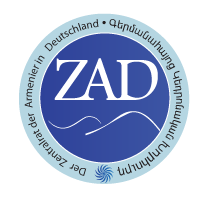The
lawmakers -- Christoph Bergner from CDU/CSU, Markus Meckel from SPD,
representative of Green Party Weishuhn -- were to express their
opinions. Views of the participants rather varied: Prof. Otto
Luchterhandt, for one, called Bundestag's resolution "schizophrenia",
pointing out at the difference of words "massacres" and "genocide" in
the title and in the confirmatory part. Opposing professor, the
lawmakers said that Luchterhandt bears no political responsibility and
that makes it easy for him to criticize. Bergner reminded of the appeal
on Armenian Genocide submitted to Bundestag back in 2000 and said that
the main reason why it was voted down was due to the "genocide
recognition" expression. If the resolution bore the heading "genocide
recognition", it would not be also accepted even by CDU/CSU. We could
pass a law condemning the Genocide but that would be of no avail,
representative of Christian Democratic Union said adding that we aim at
establishing mutual trust between the two states and launching a
dialogue to improve their relations.
The
lawmakers stated that they understand that Turkey is simply gaining
time and that they rely more on far-outer Turkish historians either in
or out of the country. Asked whether the reason of eschewing the word
"genocide" came because of the fear to lose votes of the Turkish
electorate, deputies Meckel and Weishuhn gave no answer. Explaining why
the Armenian Genocide issue appeared in the spotlight only a year ago,
Christoph Bergner, head of the South Caucasian Faction of the
Bundestag, said that he felt that a resolution should be adopted while
visiting the region.
Allegedly,
this step was directed firstly at establishing relations with Armenia ,
secondly, many EU states have already adopted resolutions on Armenian
Genocide and avoiding would set Germany apart. Not less important was
the fact that the Genocide issue can be a precondition for Turkey 's EU
accession.
If the resolution of Bundestag has no force of law what
can it provide? The vital thing, the German side thinks, is that it
opens doors for Genocide to enter history textbooks of German
Federative Republic . It must be noted though that the education
ministries of 16 German regions are independent in setting their
curriculums. Journalist Raffi Kandian thinks that all federal states
will include the Armenian genocide in their history textbooks following
the example of the State of Brandenburg . Kandian also said that
Germany 's self-condemnation in the resolution, being somewhat
reserved, sends an appeal to its former ally Turkey to follow its
example.
Turkey is, certainly, very far from following in Germany
's footsteps. In April of 2005, a khachkar (cross-stone) was erected in
Bremen in memory of the victims of Armenian Genocide. Giving in to
Turkish resistance, mayor of the town, Henning Scherf (SDU), promised
to organize an Armenian-Turkish dialogue. On June 30, an
Armenian-Turkish dispute took place at the initiative of the mayor with
the participation of Turkish consul-general to Hanover, Emine Birgen
Kesoglu, Ali Syoylemezoglu, Mustafa Colak and from the Armenian side --
Raffi Kandian and Otto Luchterhandt. The dispute proved that the Turks
of Germany are far from revising their history. Mayor Scherf said in
his turn that the Germans occupied their place in civilized world after
having criticized their history.
By Anahit Hovsepian in Germany
